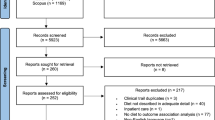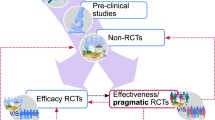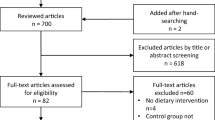Abstract
Nutrition-focused interventions are essential to optimize the bariatric care process and improve health and weight outcomes over time. Clear and detailed reporting of these interventions in research reports is crucial for understanding and applying the findings effectively in clinical practice and research replication. Given the importance of reporting transparency in research, this study aimed to use the Template for Intervention Description and Replication (TIDieR) checklist to evaluate the completeness of intervention reporting in nutritional weight management interventions adjunct to metabolic and bariatric surgery (MBS). The secondary aim was to examine the factors associated with better reporting. A literature search in PubMed, PsychINFO, EMBASE, Scopus, and the Cochrane Controlled Register of Trials was conducted to include randomized controlled trials (RCT), quasi-RCTs and parallel group trials. A total of 22 trials were included in the final analysis. Among the TIDieR 12 items, 6.6 ± 1.9 items were fully reported by all studies. None of the studies completely reported all intervention descriptors. The main areas where reporting required improvement were providing adequate details of the materials and procedures of the interventions, intervention personalization, and intervention modifications during the study. The quality of intervention reporting remained the same after vs. before the release of the TIDieR guidelines. Receiving funds from industrial organizations (p = 0.02) and having the study recorded within a registry platform (p = 0.08) were associated with better intervention reporting. Nutritional weight management interventions in MBS care are still below the desirable standards for reporting. The present study highlights the need to improve adequate reporting of such interventions, which would allow for greater replicability, evaluation through evidence synthesis studies, and transferability into clinical practice.
This is a preview of subscription content, access via your institution
Access options
Subscribe to this journal
Receive 12 print issues and online access
$259.00 per year
only $21.58 per issue
Buy this article
- Purchase on Springer Link
- Instant access to full article PDF
Prices may be subject to local taxes which are calculated during checkout



Similar content being viewed by others
Data availability
All data generated or analysed during this study are included in this published article and its supplementary information files.
References
Buchwald H, Avidor Y, Braunwald E, Jensen MD, Pories W, Fahrbach K, et al. Bariatric surgery: a systematic review and meta-analysis. Jama. 2004;292:1724–37.
Yu Y, Klem ML, Kalarchian MA, Ji M, Burke LE. Predictors of weight regain after sleeve gastrectomy: an integrative review. Surgery Obesity Related Dis. 2019;15:995–1005.
Voorwinde V, Steenhuis IH, Janssen IM, Monpellier VM, van Stralen MM. Definitions of long-term weight regain and their associations with clinical outcomes. Obes Surg. 2020;30:527–36.
Iossa A, Coluzzi I, Giannetta IB, Silecchia G. Weight loss and eating pattern 7 years after sleeve gastrectomy: experience of a bariatric center of excellence. Obesity Surg. 2020;30:3747–52.
Cassie S, Menezes C, Birch DW, Shi X, Karmali S. Effect of preoperative weight loss in bariatric surgical patients: a systematic review. Surg obes Related Dis 2011;7:760–7.
Gerber P, Anderin C, Thorell A. Weight loss prior to bariatric surgery: an updated review of the literature. Scand J Surg. 2015;104:33–9.
Julien CA, Lavoie KL, Ribeiro PAB, Dragomir AI, Mercier LA, Garneau PY, et al. Behavioral weight management interventions in metabolic and bariatric surgery: a systematic review and meta-analysis investigating optimal delivery timing. Obes Rev. 2021;22:e13168.
Kaouk L, Hsu AT, Tanuseputro P, Jessri M. Modifiable factors associated with weight regain after bariatric surgery: a scoping review. F1000Res. 2019;8:615.
Nuzzo A, Czernichow S, Hertig A, Ledoux S, Poghosyan T, Quilliot D, et al. Prevention and treatment of nutritional complications after bariatric surgery. Lancet Gastroenterol Hepatol. 2021;6:238–51.
Sherf Dagan S, Goldenshluger A, Globus I, Schweiger C, Kessler Y, Kowen Sandbank G, et al. Nutritional recommendations for adult bariatric surgery patients: clinical practice. Adv Nutr. 2017;8:382–94.
McGrice M, Paul KD. Interventions to improve long-term weight loss in patients following bariatric surgery: challenges and solutions. Diabetes, Metab Syndr Obesity: Targets Therapy. 2015;8:263.
Rauh SL, Turner D, Jellison S, Allison DB, Fugate C, Foote G, et al. Completeness of intervention reporting of clinical trials published in highly ranked obesity journals. Obesity 2021;29:285–93.
Moher D, Jones A, Lepage L, Group C, Group C. Use of the CONSORT statement and quality of reports of randomized trials: a comparative before-and-after evaluation. Jama. 2001;285:1992–5.
Hopewell S, Altman DG, Moher D, Schulz KF. Endorsement of the CONSORT Statement by high impact factor medical journals: a survey of journal editors and journal’Instructions to Authors’. Trials. 2008;9:1–7.
Plint AC, Moher D, Morrison A, Schulz K, Altman DG, Hill C, et al. Does the CONSORT checklist improve the quality of reports of randomised controlled trials? A systematic review. Med J Australia. 2006;185:263–7.
Moher D, Liberati A, Tetzlaff J, Altman DG. Preferred reporting items for systematic reviews and meta-analyses: the PRISMA statement. Int J Surg. 2010;8:336–41.
Hopewell S, Altman DG, Moher D, Schulz KF. Endorsement of the CONSORT Statement by high impact factor medical journals: a survey of journal editors and journal ‘Instructions to Authors’. Trials. 2008;9:20.
Boutron I, Altman DG, Moher D, Schulz KF, Ravaud P. CONSORT statement for randomized trials of nonpharmacologic treatments: a 2017 Update and a CONSORT Extension for nonpharmacologic trial abstracts. Ann Intern Med. 2017;167:40–7.
Hoffmann TC, Glasziou PP, Boutron I, Milne R, Perera R, Moher D, et al. Better reporting of interventions: template for intervention description and replication (TIDieR) checklist and guide. Bmj. 2014;348:g1687.
Boutron I, Moher D, Altman DG, Schulz KF, Ravaud P. Extending the CONSORT statement to randomized trials of nonpharmacologic treatment: explanation and elaboration. Annal Intern Med. 2008;148:295–309.
Julien CA, Lavoie KL, Ribeiro PA, Dragomir AI, Mercier LA, Garneau PY, et al. Behavioral weight management interventions in metabolic and bariatric surgery: a systematic review and meta‐analysis investigating optimal delivery timing. Obesity Rev. 2021;22:e13168.
Murad MH, Wang Z. Guidelines for reporting meta-epidemiological methodology research. Evid Based Med. 2017;22:139–42.
Negi A, Asokkumar R, Ravi R, Lopez-Nava G, Bautista-Castaño I. Nutritional management and role of multidisciplinary follow-up after endoscopic bariatric treatment for obesity. Nutrients. 2022;14:3450.
Wright C, Barnett A, Campbell KL, Kelly JT, Hamilton K. Behaviour change theories and techniques used to inform nutrition interventions for adults undergoing bariatric surgery: a systematic review. Nutr Diet. 2022;79:110–28.
Page P, Hoogenboom B, Voight M. Improving the reporting of therapeutic exercise interventions in rehabilitation research. Int J Sports Phys Ther. 2017;12:297–304.
Toomey E, Hardeman W, Hankonen N, Byrne M, McSharry J, Matvienko-Sikar K, et al. Focusing on fidelity: narrative review and recommendations for improving intervention fidelity within trials of health behaviour change interventions. Health Psychol Behav Med. 2020;8:132–51.
Borrelli B. The assessment, monitoring, and enhancement of treatment fidelity in public health clinical trials. J Public Health Dent. 2011;71:S52–63.
Borrelli B, Sepinwall D, Ernst D, Bellg AJ, Czajkowski S, Breger R, et al. A new tool to assess treatment fidelity and evaluation of treatment fidelity across 10 years of health behavior research. J Consult Clin Psychol. 2005;73:852–60.
Bellg AJ, Borrelli B, Resnick B, Hecht J, Minicucci DS, Ory M, et al. Enhancing treatment fidelity in health behavior change studies: best practices and recommendations from the NIH Behavior Change Consortium. Health Psychol. 2004;23:443–51.
JaKa MM, Haapala JL, Trapl ES, Kunin-Batson AS, Olson-Bullis BA, Heerman WJ, et al. Reporting of treatment fidelity in behavioural paediatric obesity intervention trials: a systematic review. Obes Rev. 2016;17:1287–300.
Giagio S, Innocenti T, Salvioli S, Lami A, Meriggiola MC, Pillastrini P, et al. Completeness of exercise reporting among randomized controlled trials on pelvic floor muscle training for women with pelvic organ prolapse: a systematic review. Neurourol Urodyn. 2021;40:1424–32.
Albarqouni L, Glasziou P, Hoffmann T. Completeness of the reporting of evidence-based practice educational interventions: a review. Med Educ. 2018;52:161–70.
Thomas O, Thabane L, Douketis J, Chu R, Westfall AO, Allison DB. Industry funding and the reporting quality of large long-term weight loss trials. Int J Obes. 2008;32:1531–6.
Chen Y, Yang K, Marušic A, Qaseem A, Meerpohl JJ, Flottorp S, et al. A reporting tool for practice guidelines in health care: the RIGHT statement. Ann Intern Med. 2017;166:128–32.
Moja PL, Moschetti I, D’Amico R. Outcome reporting bias in government-funded RCTs. Cmaj. 2005;172:857.
Myers EF, Parrott JS, Cummins DS, Splett P. Funding source and research report quality in nutrition practice-related research. PLoS One. 2011;6:e28437.
Levine J, Gussow JD, Hastings D, Eccher A. Authors’ financial relationships with the food and beverage industry and their published positions on the fat substitute olestra. Am J Public Health. 2003;93:664–9.
Khan SN, Mermer MJ, Myers E, Sandhu HS. The roles of funding source, clinical trial outcome, and quality of reporting in orthopedic surgery literature. Am J Orthop. 2008;37:E205–12.
The Lancet O. Clinical trial registry reporting: a transparent solution needed. Lancet Oncol. 2019;20:741.
Kosa SD, Mbuagbaw L, Borg Debono V, Bhandari M, Dennis BB, Ene G, et al. Agreement in reporting between trial publications and current clinical trial registry in high impact journals: a methodological review. Contemp Clin Trials. 2018;65:144–50.
De Angelis C, Drazen JM, Frizelle FA, Haug C, Hoey J, Horton R, et al. Clinical trial registration: a statement from the International Committee of Medical Journal Editors. N Engl J Med. 2004;351:1250–1.
Reveiz L, Cortés-Jofré M, Asenjo Lobos C, Nicita G, Ciapponi A, Garcìa-Dieguez M, et al. Influence of trial registration on reporting quality of randomized trials: study from highest ranked journals. J Clin Epidemiol. 2010;63:1216–22.
Trinquart L, Dunn AG, Bourgeois FT. Registration of published randomized trials: a systematic review and meta-analysis. BMC Med. 2018;16:173.
Aslam A, Imanullah S, Asim M, El-Menyar A. Registration of clinical trials: is it really needed? N Am J Med Sci. 2013;5:713–5.
Yamato TP, Maher CG, Saragiotto BT, Catley MJ, Moseley AM. Rasch analysis suggested that items from the template for intervention description and replication (TIDieR) checklist can be summed to create a score. J Clin Epidemiol. 2018;101:28–34.
Acknowledgements
Sources of support for the work: Funding for data collection was provided by operating grants from the Canadian Institutes of Health Research (CIHR) (PJT-153424 and UD1-170148). The members of the Montreal Behavioral Medicine Centre are supported by a variety of career and scholarship awards. SLB is supported by the CIHR-Strategy for Patient-Oriented Research (SPOR) initiative through the Mentoring Chair program (SMC-151518) and by the Fonds de recherche du Québec: Santé (FRQS) through the Chaire de recherche double en Intelligence Artificielle/Santé Numérique ET sciences de la vie program (309811). KLL is supported by a UQAM Research Chair and Canada Research Chair (CRC) in Behavioral Medicine (CRC-2019-00225). VGB is funded by the Canadian Institutes of Health Research (MFE-181809), and the Michael Smith Health Research BC (2021–1498). TBP, RY, VGB and AF are supported by FRQS scholarships. The supporting sources had no involvement in the study design, collection, analysis, interpretation of data, writing of the report, or any restrictions regarding the submission of the report for publication.
Author information
Authors and Affiliations
Contributions
TBP, RY, SLB, JS, and KL designed the study, its conceptualization and methodology. TBP, RY, SLB, JS, VGB, and AF conducted research. TBP, RY, and SLB analyzed data. All authors contributed on writing the paper. SLB had primary responsibility for final content. All authors read and approved the final manuscript. The authors would like to thank the Montreal Behavioral Medicine Centre (MBMC) staff and students for their teamwork and ongoing support.
Corresponding author
Ethics declarations
Competing interests
TBP, RY, JS, VGB, and AF have nothing to disclose. Dr. Lavoie has served on the advisory board for Schering-Plough, Takeda, AbbVie, Almirall, Janssen, GSK, Astellas, Novartis, Boehringer Ingelheim (BI), and Sojecci Inc. and received sponsorship for investigator-generated research grants from GSK and AbbVie; speaker fees from GSK, Astra-Zeneca, X-Facto, Astellas, Novartis, BI, Takeda, Janssen, AbbVie, Merck, Bayer, Pfizer, Schering-Plough, Mundipharma, and Air Liquide; and support for educational materials from Merck, none of which are related to the current article. Dr. Bacon has received consultancy fees from Respiplus and Merck for the development of behavior change continuing education modules and speaker fees from Respiplus, Novartis, and Janssen and has served on advisory boards for Bayer, Sanofi, and Sojecci Inc., none of which are related to the current article.
Additional information
Publisher’s note Springer Nature remains neutral with regard to jurisdictional claims in published maps and institutional affiliations.
Supplementary information
Rights and permissions
Springer Nature or its licensor (e.g. a society or other partner) holds exclusive rights to this article under a publishing agreement with the author(s) or other rightsholder(s); author self-archiving of the accepted manuscript version of this article is solely governed by the terms of such publishing agreement and applicable law.
About this article
Cite this article
Ben-Porat, T., Yousefi, R., Stojanovic, J. et al. Completeness of intervention reporting of nutrition-focused weight management interventions adjunct to metabolic and bariatric surgery: effect of the TIDieR checklist. Int J Obes (2024). https://doi.org/10.1038/s41366-024-01506-6
Received:
Revised:
Accepted:
Published:
DOI: https://doi.org/10.1038/s41366-024-01506-6



